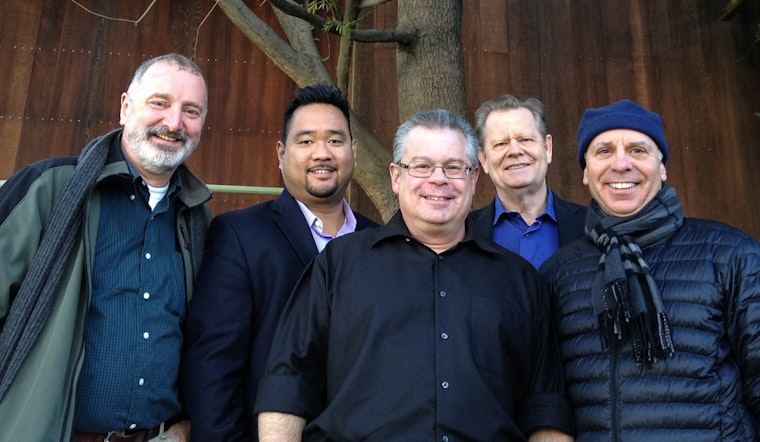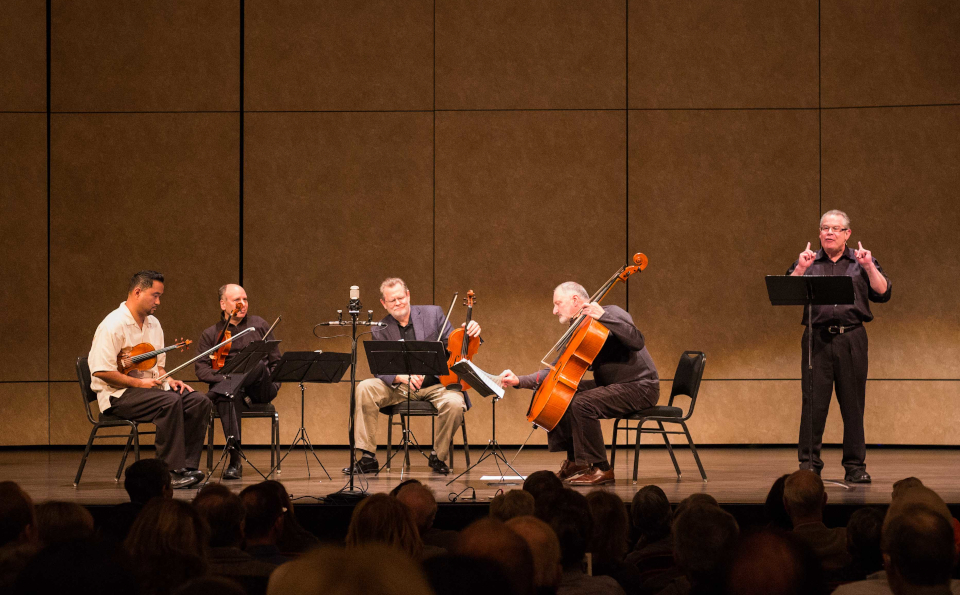
Robert Greenberg has a difficult job: to share his love of music with an audience, with words as his only instrument.
For almost 30 years, "Dr. Bob" has gone up on stage seven times a year to open for the Alexander String Quartet, explaining classical music to a lay audience. The quartet often joins him for these mini-lectures, playing some illustrative examples as Greenberg explains the music and its background. Then Greenberg leaves the stage, and the quartet takes it from the top.
But don't call him a teacher.
"I'm a contextualizer," he says. "And, to a certain degree, an entertainer."
Greenberg grew up in the suburbs of New York City, attending Princeton University for his undergraduate degree. Afterwards, he did actually work as a teacher — at a high school — for a couple of years. But his passion for music never waned, and he soon found a place in the Ph.D. program in composition at UC Berkeley.
He landed in Berkeley in 1978, and after just six hours, "I said to myself: 'I'm home, this is it.'"
"The sky is sapphire blue," he recalls. "Everything looks magnified, like you could touch Marin with your hands from Berkeley. The air had that beautiful, pure smell you never, ever have on the East Coast. I've never left."
Greenberg eventually earned his Ph.D., but rather than enter the academic rat race as a university professor, he decided to shift into composing and teaching music history to whoever would listen.
In 1992, Ruth Felt, the founder and then-director of SF Performances, came up with the idea of using Greenberg's gift of gab to provide accessible, informed, yet fun program notes as part of the show.
Greenberg is now the music historian in residence at SF Performances. He also pens weekly columns on his website, and he's creating a 10-lecture podcast series for Audible on Beethoven, whose 250th birthday is this year.
Greenberg precedes SF Performances programs on Saturday mornings, a time slot he loves because it's an opportunity for people to come into the city and spend the day there, with no dress code or parking hassles.
"It's the easiest day — unless you're an orthodox Jew," he says. "But God wouldn't mind if you listened to some Beethoven for a change."

The 250th anniversary of Beethoven's birth doubles as the theme for this season's Saturday-morning series, with seven performances surveying the composer's string quartets. Greenberg says he's confident there's something fresh to say about such a well-known composer.
"It's how you tell the story," he says. "Can you give information people can absorb, that's analogous to their own lives? Can you create metaphors to understand who he was?"
Greenberg notes that Beethoven had a very unhappy childhood, and was aggressively ambitious and driven.
"When it came to music, Ludwig had no self-doubt, but for everything else, he was plagued with fear," he explains. "The man worked like a dog on his music — he wasn't a Mozart, who sat down and just wrote it down."
Greenberg lives in Oakland's Montclair neighborhood. He's a father of four and a soon-to-be grandfather — he has grown children who are 33 and 30, while his younger children are 11 and 13. "I hang out a lot at the dinner table, or doing homework," he notes.
The musical tastes of younger people do not scare or faze Greenberg. Hip-hop, for example, allows him to educate and contextualize via the blues, which developed after the Civil War in the American South. The genre has diverse roots: West African micro-tonal melody, West African polyrhythms and European instruments and harmonic practices.
"Rap is 20th-century blues," he explains. "We've got protest poetry, set to rhythms of African drumming, where an American underclass finds outlet in a music of protest. It's a safety valve. It's a way of dealing with issues that a community has endured for centuries."
He's also sanguine about why teens embrace hip-hop, rather than, say, Beethoven.
"Teenage kids are filled with angst: their bodies are changing, their minds are changing, they don't want to be like their parents," Greenberg notes. "They're trying to find something cool and hip and modern they can embrace, and that reflects their own misgivings and foolish anger. I take a certain amount of solace in that knowledge."
A knowledge that he's always willing to share.
Robert Greenberg and the Alexander String Quartet will next appear this Saturday, January 25 at Herbst Theater (401 Van Ness Ave.) Tickets start at $45.








-1.webp?w=1000&h=1000&fit=crop&crop:edges)
